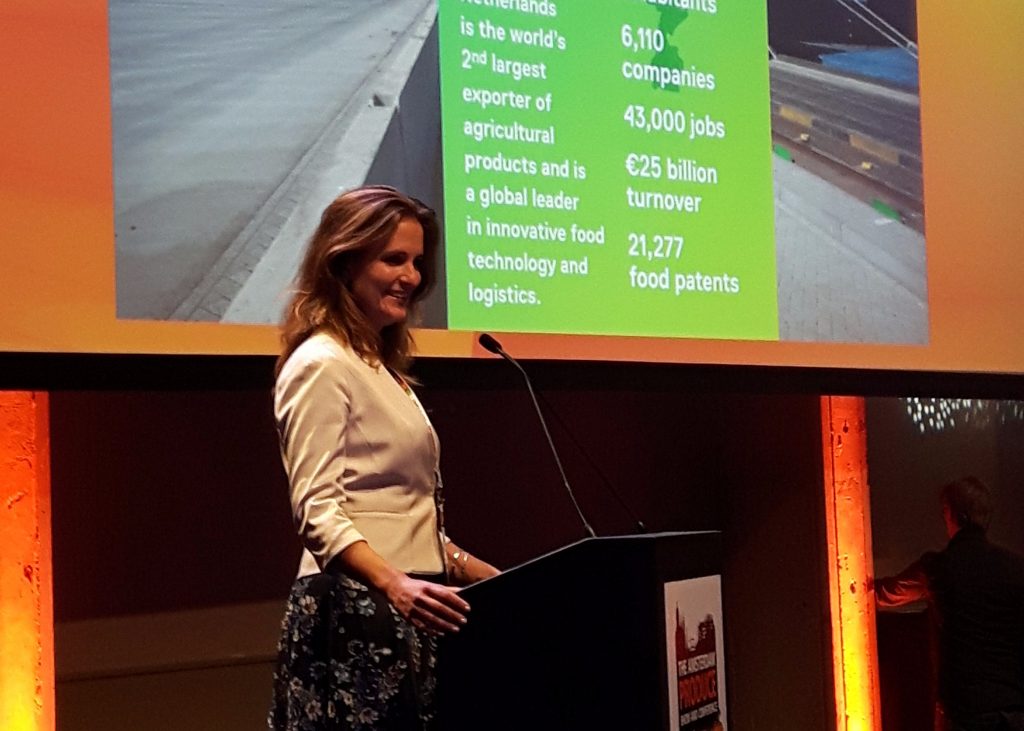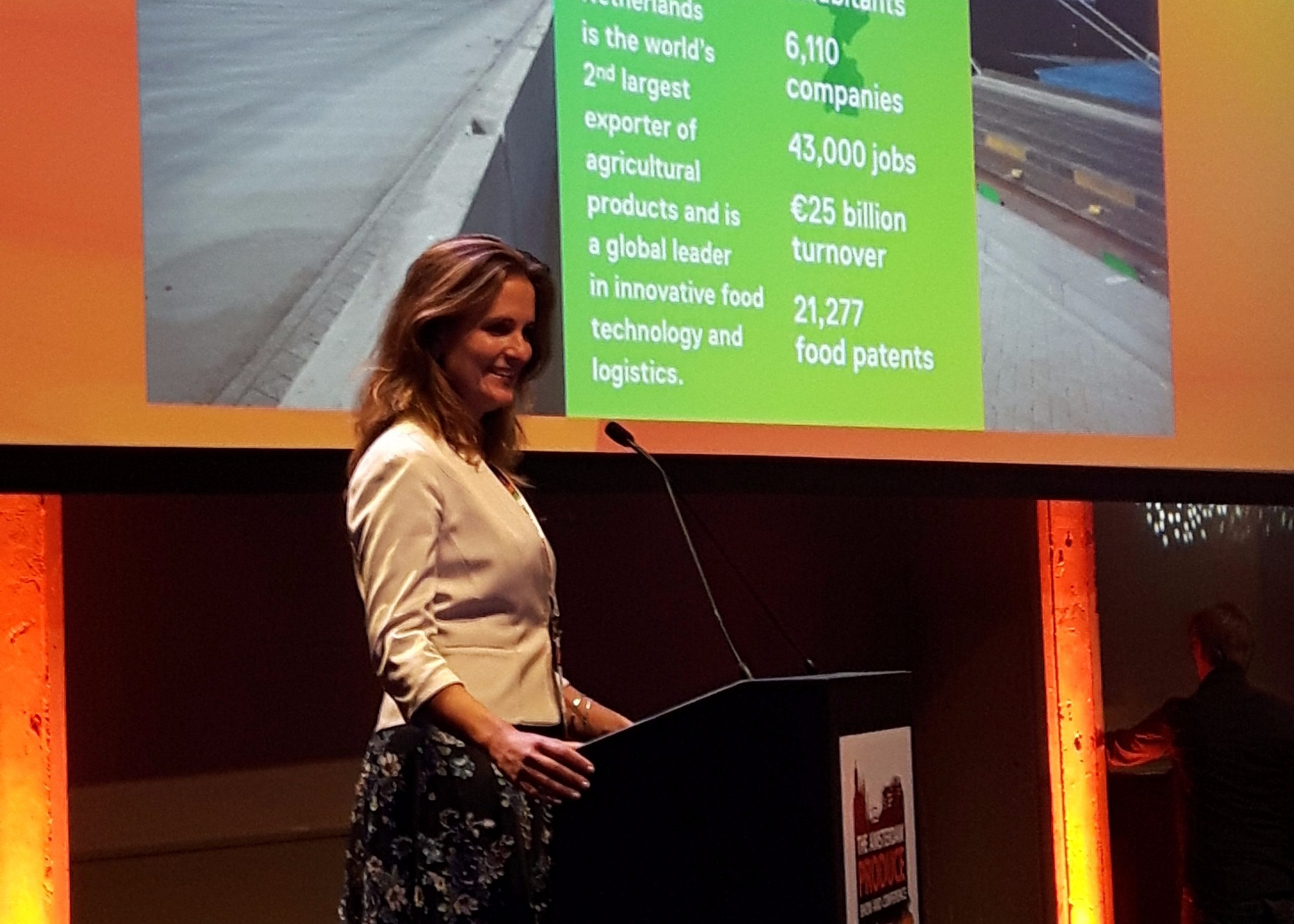How Rotterdam’s food cluster fosters innovation, sustainability, profitability
How the sector will make money in 30 years was the question posed by Sharon Janmaat, food cluster project manager for the City of Rotterdam, during her presentation at the first ever Amsterdam Produce Show, held last November 2-4.
“And what will we need for that in terms of innovation, circularity and digital developments?” she asked.
That is where the Rotterdam Food Cluster comes in. An initiative of the City of Rotterdam, it was set up to create room, facilitate business ideas and accelerate growth so the area can maintain its leading position in food amidst an industry changing under the influence of technological innovation and more awareness of the depletion of natural resources. “We want to move towards a sustainable and resilient economic future,” Janmaat said.
Rotterdam’s unique location is ideal for a cluster
The region has a very high concentration of relevant businesses, research institutions and universities. It is one of few places in the world where all the links in the food chain are within a 30 km radius. About 6,100 food companies – including leading multinational companies such as Unilever, Rijk Zwaan and DSM- are located in this area, employing about 43,000 people and generating annual turnover of over €24 billion.
It is also home to the Port of Rotterdam, the world’s second largest importer of fresh food, Europe’s largest deep sea port and the gateway to over 500 million people. All this combined makes for the world’s leading food production area, Janmaat said. Now the challenge is to maintain that lead in the global food economy in the current economic climate.
The proximity of so many companies in the same chain creates a base for forming clusters and forging both physical and relational links between those clusters. “It is about gaining knowledge and participating in networks,” said Janmaat.
“To be able to keep doing what we stand for and for the chain to keep the influence it already has, we are creating the most innovative world food park that is resilient, sustainable, circular as well as profitable.”
Collective innovations
Innovation will be the key to maintain the sector’s success. Janmaat observes that the sector is successful but mainly innovates at a company level.
“We want to initiate innovation projects that require more collectivity,” she said.
As a cluster, the companies are able to work together to estimate and share risks effectively, and to make investments in joint benefits. The City of Rotterdam aims to be a trustworthy partner in this process. Janmaat is employed by the city but transcends municipality borders to initiate, connect and create conditions for innovation in the food chain within the region against the backdrop of what is a one-off public-private cooperation.
Data sharing
The focus of the region is on four core themes, one of which is in the field of smart logistics. This industry is very data driven and Janmaat observes that currently a lot of data is not shared. She is convinced data sharing will lead to more sustainable transport as well as greater profitability.
However many companies are reluctant to share data due to the sensitivity of the information it reveals. Data encryption can be a solution. “We are investigating how we can do that and how we can help those companies to evolve towards smart logistics,” Janmaat said. The aim is to get the commitment of stakeholders that are willing to invest in a pilot project.
Another area that has to deal with sensitive information and data sharing is human capital. The Rotterdam Food Cluster seeks to create a human capital pool that combines flexibility and a steady workforce.
Janmaat sees that many of the large flexible workforce that are employed by food companies often have very little connection to the company or the industry they are working in.
“We are investigating new ways of contracting that create a steady pool of people who have the network, knowledge and experience to add value to the company that employs them,” Janmaat said.
Connected to this field of interest work needs to be done on encryption, so companies can safely access the pool, a legal base for the flexible use of the steady pool and a human resource management system that will enable education.
Tennis balls that last longer & other ways to use waste
The depletion of natural resources does make the industry look in different ways and brings about a search for new business models. Sometimes those can be found in the valorisation of waste flows. Such as the producer of tennis balls who found that the balls can be used 10 times longer if they are exposed to a certain biogas that is derived from fresh waste flows. The main goals for the region now are to identify the waste flows and invest in new technology that is needed to unlock the value of fresh waste.
Although sustainable energy has been on the agenda for quite some time already and the sector is aware that investments in sustainable energy are needed, the focus of the Rotterdam Food Cluster is on the collectivity in this area too. “We seek to create a structure in which food companies can be shareholder and not only customers,” said Janmaat. “This way the production of sustainable energy can become part of their business model.” This requires investigation into energy production and creating a legal basis for stakeholders to become shareholders.
Although the initiative is firmly underway and the lines are plotted, a lot of work remains to be done. And that is the key to the Rotterdam Food Cluster. “We aim to encourage working together,” Janmaat said.




